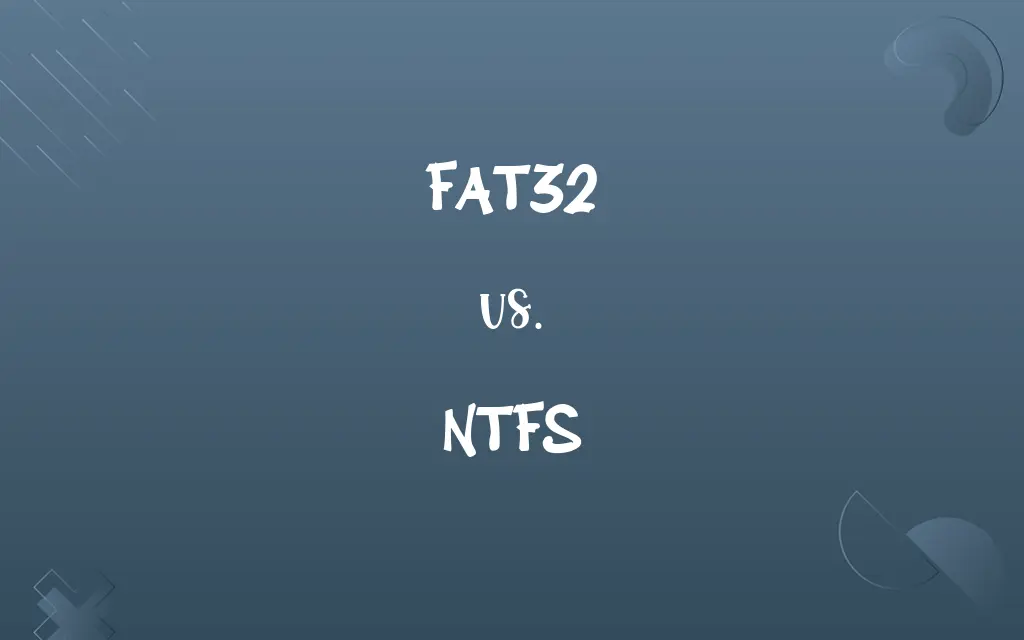FAT32 vs. NTFS: Know the Difference

By Hifza Nasir & Shumaila Saeed || Published on March 6, 2024
FAT32 is compatible with a wider range of devices and OSes but has a 4GB file size limit, whereas NTFS supports larger files and includes security features but is less compatible.

Key Differences
FAT32, established in 1996, is widely recognized for its universal compatibility across various devices, including older ones, making it ideal for external storage media. In contrast, NTFS, introduced with Windows NT in 1993, is preferred for internal drives due to its support for larger file sizes and volumes, showcasing its suitability for modern storage needs.
Shumaila Saeed
Mar 06, 2024
FAT32 is limited to a maximum file size of 4GB and a volume size of 2TB, NTFS breaks these boundaries, accommodating files and volumes in the terabyte range, highlighting its advantage for handling large datasets. NTFS also integrates advanced features such as file encryption, disk quotas, and detailed permissions, offering enhanced security and management capabilities that FAT32 lacks.
Hifza Nasir
Mar 06, 2024
FAT32's simplicity and broad compatibility mean it is often the go-to for removable storage, ensuring usability across different platforms without the need for additional software. NTFS, with its complex structure, might require third-party tools for full functionality on non-Windows platforms, limiting its universal applicability but not its significance in Windows environments.
Shumaila Saeed
Mar 06, 2024
Comparison Chart
ADVERTISEMENT
Compatibility
Universal across many devices/OSes
Primarily Windows, with limited support on others
Dua Fatima
Mar 06, 2024
FAT32 and NTFS Definitions
FAT32
A file system designed for compatibility with a wide range of devices.
I formatted my USB drive as FAT32 to use it with my gaming console.
Shumaila Saeed
Feb 26, 2024
NTFS
Offers features like encryption and disk quotas.
NTFS allows setting disk quotas to manage user storage limits.
Hifza Nasir
Feb 26, 2024
ADVERTISEMENT
FAT32
Known for its simplicity and universal support.
FAT32 is often used for flash drives due to its wide compatibility.
Shumaila Saeed
Feb 26, 2024
NTFS
A file system with support for large files and advanced features.
I use NTFS for my internal drives to benefit from its security options.
Shumaila Saeed
Feb 26, 2024
FAT32
Ideal for external drives and digital devices.
FAT32 is my go-to file system for external hard drives.
Hifza Nasir
Feb 26, 2024
NTFS
Less compatible with non-Windows operating systems.
Accessing NTFS on Mac requires additional software.
Shumaila Saeed
Feb 26, 2024
FAT32
Does not support advanced features like file permissions.
FAT32 is unsuitable for sensitive files since it lacks encryption.
Hifza Nasir
Feb 26, 2024
ADVERTISEMENT
NTFS
Preferred for internal hard drives and Windows installations.
Windows systems are typically installed on NTFS partitions.
Shumaila Saeed
Feb 26, 2024
FAT32
Limits file sizes to 4GB, affecting large file storage.
I couldn't store my video project on a FAT32 drive due to the file size limit.
Hifza Nasir
Feb 26, 2024
NTFS
Can handle extremely large volumes and files.
NTFS was essential for storing my extensive database efficiently.
Hifza Nasir
Feb 26, 2024
Repeatedly Asked Queries
Why would I choose NTFS over FAT32?
Choose NTFS for larger file sizes, volumes, and additional security features.
Shumaila Saeed
Mar 06, 2024
Is NTFS compatible with Mac and Linux?
NTFS is primarily designed for Windows, but can be accessed on Mac and Linux with third-party tools.
Shumaila Saeed
Mar 06, 2024
How does the compatibility of FAT32 benefit users?
FAT32's compatibility ensures it works with a wide range of devices and operating systems, including older ones.
Dua Fatima
Mar 06, 2024
What is FAT32?
FAT32 is a file system known for its broad compatibility and simplicity, ideal for removable storage.
Shumaila Saeed
Mar 06, 2024
Why is FAT32 still used today?
Its simplicity and universal compatibility make it ideal for removable storage and devices across different platforms.
Shumaila Saeed
Mar 06, 2024
What limitations does FAT32 have compared to NTFS?
FAT32 is limited by file and volume size and lacks advanced features like encryption.
Hifza Nasir
Mar 06, 2024
What are the security features of NTFS?
NTFS includes file encryption, permissions, and disk quotas for enhanced security and management.
Hifza Nasir
Mar 06, 2024
What is NTFS?
NTFS is a file system offering large file support and advanced features, preferred for Windows environments.
Hifza Nasir
Mar 06, 2024
Can I convert FAT32 to NTFS without losing data?
Yes, Windows provides a way to convert FAT32 to NTFS without data loss, but backing up data is recommended.
Hifza Nasir
Mar 06, 2024
How does NTFS handle large volumes and files?
NTFS can support volumes up to 256TB and files as large as 16EB, accommodating modern storage needs.
Hifza Nasir
Mar 06, 2024
What is the maximum volume size for FAT32?
The maximum volume size for FAT32 is 2TB with 512-byte sectors.
Hifza Nasir
Mar 06, 2024
Why might someone prefer FAT32 for an external drive?
Its wide compatibility makes it a reliable choice for devices and operating systems, ensuring accessibility.
Hifza Nasir
Mar 06, 2024
Can all operating systems read and write to NTFS formatted drives?
While most can read NTFS, writing often requires additional software on non-Windows systems.
Shumaila Saeed
Mar 06, 2024
Does NTFS performance differ from FAT32?
NTFS may offer better performance and efficiency, especially with large files and volumes, due to its advanced structure and features.
Shumaila Saeed
Mar 06, 2024
Share this page
Link for your blog / website
HTML
Link to share via messenger
About Author
Written by
Hifza NasirCo-written by
Shumaila SaeedShumaila Saeed, an expert content creator with 6 years of experience, specializes in distilling complex topics into easily digestible comparisons, shining a light on the nuances that both inform and educate readers with clarity and accuracy.








































































